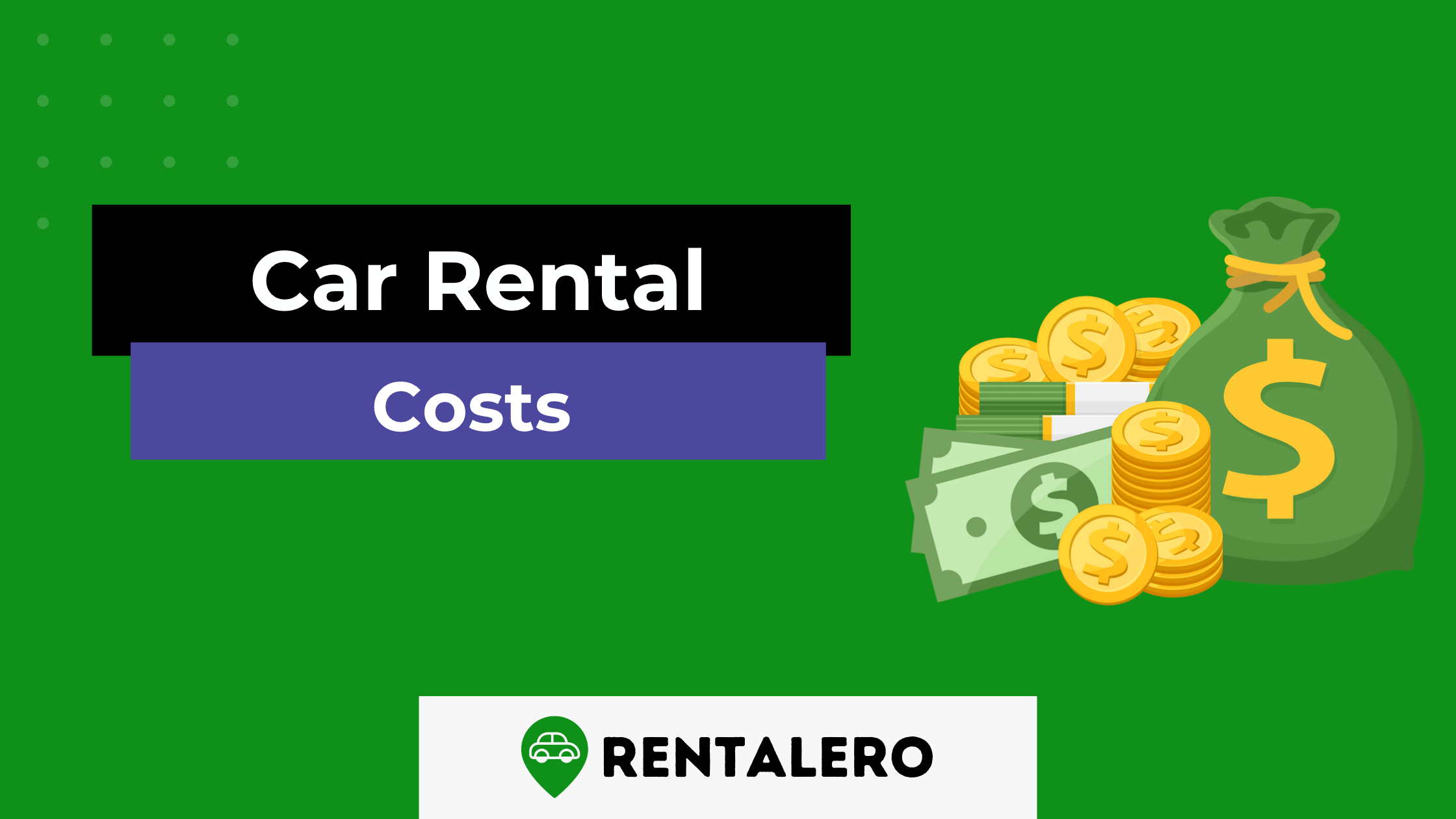Renting a car is a practical solution when you need wheels for a road trip, a business trip, or while your vehicle is in the shop.
But how much does it cost to rent a car?
In this guide, we’ll break down the costs of car rentals. We’ll explore everything from base prices to additional fees and insurance options, helping you understand where your money goes and how to get the best deal.
Advertising links are marked with *. We receive a small commission on sales, nothing changes for you.
Key Takeaways
- The cost of a car rental depends on several factors, including the location, length of the rental period, car type, and any additional products or insurance selected.
- Costs can vary greatly, but affordable options are often available. Booking in advance often results in below-average prices.
- Weekly rentals can sometimes be cheaper than daily rentals, but this depends on various factors.
- Additional fees can significantly increase the cost of renting a car. These include late return fees, fuel charges, insurance, and equipment rental fees.
- Understanding the factors influencing the cost of car rentals can lead to significant savings and a smoother rental experience.
Factors That Determine the Cost of Car Rental
Renting a car can be a convenient way to get around when you’re away from home. However, the cost of renting a car can vary widely and is influenced by many factors.
Whether you’re budgeting for a vacation or simply curious about the costs associated with car rentals, it’s essential to understand the key elements that shape these fees.
Location
The adage “location, location, location” holds even in the car rental industry.
The cost of car rentals can vary significantly from one city to another and even from one rental office to another within the same city.
Typically, renting a car at airports or city centers can be more expensive due to higher operating costs and demand.
Conversely, rental offices in suburban or rural areas might offer more competitive rates.
Duration Matters
The length of the rental period also plays a pivotal role in determining the cost. Generally, the longer you rent the car, the lower the daily rate will be.
Many rental companies offer discounted weekly or monthly rates that can be more economical if you need a car for an extended period.
However, it’s also worth noting that some companies might charge a fee for early returns, essentially penalizing customers who alter the rental period post-booking.
Type of Vehicle
The type of car you choose to rent can also significantly impact the cost. Economy cars are usually the most affordable option, while luxury vehicles or SUVs have higher rental rates.
Size, brand, and model can all contribute to the cost, so consider what type of vehicle you truly need for your trip.
Extras Add Up
Car rental companies offer a variety of additional products and services, such as GPS systems, child seats, additional drivers, and pre-paid fuel options. While these can add convenience to your trip, they can also add to the total cost of your rental.
Additionally, insurance products like Collision Damage Waiver (CDW) or Supplemental Liability Protection (SLP) can significantly inflate the total cost of your rental.
While it’s crucial to have adequate insurance coverage when renting a car, it’s advisable to check whether your personal car or credit card insurance provides any coverage to avoid unnecessary expenses.
Variability in Car Rental Costs
Car rental pricing can fluctuate wildly, influenced by various factors we’ve previously discussed. From high-end luxury vehicles to budget-friendly economy cars, there’s a broad spectrum of costs to navigate.
However, despite the variability, affordable options are often available for those willing to do a little homework.
Affordable Options in Car Rentals
Although the variability can be daunting, the car rental market offers options to fit almost any budget. Economy or compact cars, for instance, are usually the most affordable choices.
In addition, these vehicles offer lower rental rates and better fuel efficiency, offering a two-pronged approach to cost-saving.
Renting older models can also help cut costs. Some rental companies maintain a fleet of older vehicles that they rent out at lower prices.
While these cars may not have all the latest features, they are typically well-maintained and can be a great option for budget-conscious renters.
The Cost of Weekly Car Rentals
The mantra “the more, the cheaper” often rings true in the car rental industry. Many rental companies offer discounted rates for longer rental periods, such as weekly or monthly rentals.
These rates are often cheaper than the daily rate multiplied by the number of days in the week, making them a more economical choice for those needing a vehicle for an extended period.
However, this is not a universal rule. Factors such as the rental location, demand, and the specific rental company can influence whether a weekly rate will be cheaper than a daily rate.
Therefore, comparing the total cost for different rental periods when booking is always advisable.
Additional Fees
The initial quote for a car rental often doesn’t tell the full story. Numerous additional fees can inflate your final bill.
Let’s explore some of these potential costs.
Late Return Fees
In the rental car world, punctuality is paramount. Returning a vehicle late can trigger a late return fee.
Moreover, if you significantly extend your rental period, the rental company may revert to a higher daily rate, causing your costs to skyrocket.
Fuel Charges
Most rental companies require you to return the car with a full gas tank. Failure to do so can result in a fuel charge, which usually includes both the cost of the gas and a service fee.
To avoid this, make a note to refuel the car before returning it.
Insurance Costs\
Insurance is a significant factor to consider when renting a car. Rental companies offer various types of coverage, including collision damage waiver (CDW), liability insurance, personal accident insurance (PAI), and personal effects coverage (PEC).
While these protections can provide peace of mind, they are expensive.
Sometimes, your personal car insurance or credit card company may already provide rental car coverage, which could help you save on these fees.
It’s important to check with these providers before opting for the rental company’s insurance.
Other Potential Fees
There are several other fees that you may encounter, including:
Young Driver Fees:
Renters under a certain age (usually 25) may have to pay an additional fee.
Additional Driver Fees:
There may be a charge for adding extra drivers to the rental agreement.
Equipment Rental Fees:
Items like GPS units, car seats, or ski racks are typically not included in the basic rental cost.
Conclusion
Understanding the costs of car renting can be complex, laden with many variables.
From the location, car type, and rental duration to the fine print detailing additional fees, it’s clear that the price tag of a car rental extends beyond the initial quoted rate.
However, with due diligence, planning, and a keen eye for detail, navigating this maze and finding a deal that best suits your budget and needs is possible.
Frequently Asked Questions
How can I find the cheapest car rental deals?
Consider booking your car in advance, comparing prices from multiple rental companies, and being flexible with pickup and drop-off locations. Off-airport locations may offer lower rates. Check for discounts or promotional codes as well.
Can I save money by renting a car for a week?
Often, rental companies offer discounted weekly rates cheaper than renting for individual days. However, this isn’t always the case, so comparing prices for different rental durations is worth doing.
What additional fees could I be charged when renting a car?
Additional fees can include late return fees, fuel charges, insurance costs, young driver fees, additional driver fees, and equipment rental fees.

Nzoputa has been writing for Rentalero since day one and is one of our most experienced members when it comes to the rental industry. For her, nothing beats Uber!
Advertising links are marked with *. We receive a small commission on sales, nothing changes for you.

